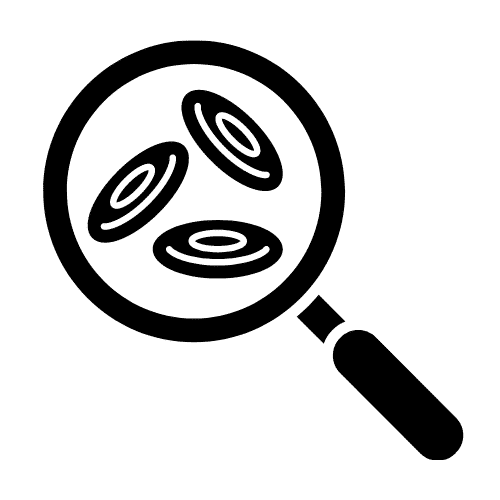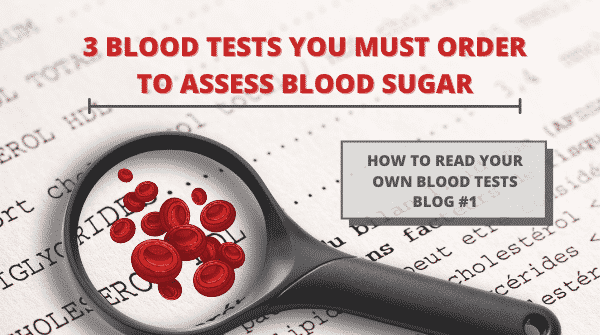Updated October 8th, 2020
Three blood tests you must order to assess blood sugar control properly. (Your doctor is most likely only tracking one, two if you’re lucky—but definitely not three!)
If you have been reading my blog for a while, or are a patient of mine, you probably know that we view sugar and blood sugar disturbances as target number one in regaining your health. Disturbed blood sugar balance causes inflammation, hormonal imbalance, impaired immune response, and depletion of vitamins and minerals, just to name a few of the problems. Also, the diet that will give you blood sugar problems (the Standard American Diet) will also cause most of the disturbances and deficiencies, both vitamin and mineral, that we find on lab panels. For this reason, we address blood sugar control and diet first, as it is probably the simplest and easiest thing to improve.
It is no exaggeration to say that blood sugar has a link to over 80% of our problems with chronic disease. In fact, it is estimated that one in three individuals are either diabetic or prediabetic right now, and 80% do not even know it! Once you are diagnosed as being prediabetic, the chance that you will become diabetic without diet and exercise correction within five years is 90%! I do not think it is too bold of a statement to say that we have to get control of this problem right now!
1. Fasting Blood Sugar (Glucose)
All of this being said, when I ask patients about blood sugar problems, they often say “my doctor says that my blood sugar is fine”. So we are faced with the question: if so many people have diabetes and prediabetes and don’t even know it, why are their doctors telling them that their blood sugar is fine? Well, when you look at people’s labs, you often see the doctors only order one blood sugar test—fasting blood sugar. This is the least reliable of all blood sugar tests. I would say with 99% certainty, this is the reason why so many blood sugar problems are overlooked. So how to know where you really stand regarding your blood sugar? The answer is, that there are actually three blood sugar tests that you must run in order to know how well you handle sugar.
The Problem With Only Testing Fasting Blood Sugar
Here is the problem: fasting blood sugar tells you what your blood sugar is at that moment, and only at that moment. I once had a patient who was completely diabetic and had low fasting blood sugar (in the morning she had low blood sugar, and the rest of the day it was dangerously high)! This is not uncommon (in fact, it commonly happens before people develop full-blown diabetes)! In order to properly assess blood sugar management, we have to know what our blood sugar is, what its average is over the past two months, and how much effort the body has to put into balancing that blood sugar.
2. Hemoglobin A1c
We already said that fasting blood sugar measures blood sugar at one point in time. How do we get a more comprehensive look? Well, there are two other tests that measure that perfectly. The first test is called hemoglobin A-1 C, or HA1C. It’s a measurement of how much damage is done to hemoglobin molecules by an excess of sugar over a two-month period. It is an accurate measurement of blood sugar average over the past two months. The optimal lab value for HA1C is 5.5.
3. Fasting Insulin
The second test is fasting insulin. This test measures how hard your body must work in order to balance your blood sugar. In other words, it’s a measurement of how much insulin your body has to produce in order to bring blood sugar down. For optimal health, this should be below 6 when fasting.
Here’s the kicker—people have gotten so sick, which has brought up the average lab value (see here for my blog on the difference between standard and functional lab reference ranges), that people can now have a fasting insulin of over 25, and still not get a red flag! This is a disaster! Studies have shown that fasting insulin levels over 8 are associated with an increased risk of heart disease!
Bonus: Combine Blood Sugar and Insulin Results
Another way of putting together this information on fasting blood sugar and fasting insulin is called the HOMA-IR. HOMA-IR stands for the Homeostatic Model Assessment of Insulin Resistance. It combines the measurements of fasting blood glucose and fasting blood insulin to give a good measure of how hard your body has to work in order to maintain stable blood glucose levels. The calculation is (fasting blood glucose X fasting insulin) divided by 405. Below 1.5 is optimum. Between 1.5-3 is the beginning of problems, and over 3 is severe.
All right, so let’s recap. Fasting blood sugar tells you what your blood sugar is at that specific moment. Hemoglobin A-1 C, or HA1C, tells you what your average blood glucose is for the last two months. Fasting insulin tells you how much insulin your body has to use in order to bring your blood sugar down. HOMA-IR is a combination of fasting blood sugar and fasting blood insulin. In other words, how hard your body has to work to balance blood sugar. So, what does this mean in real-world terms?
Real-World Example
To illustrate this, I had a patient come in to see me about six months ago. Let’s call him Jim. He had mental symptoms of brain fogginess and mentally “checking out”. His doctor had run bloodwork on him, and his fasting blood sugar was 100. This is too high in the pre-diabetic range but not diabetic yet, even by a long shot.
So, I ran the other two tests, the HA1C, and the fasting insulin. Jim’s HA1C was 5.4, which is nearing the top of the optimal lab value of 5.5, but not alarming at all. His fasting insulin, however, was 29! His HOMA-IR was 7.16! That’s bananas! His body was working extremely hard to keep his blood sugar at normal levels, which was causing massive inflammation and stress on his body and brain! No wonder he felt like garbage! And the kicker was, but not only did his doctor not check for it but even if he did, it would have been “only a little off”! Jim’s fasting blood sugar was almost 5 times the optimum, but just barely over the standard lab reference range! Fail!
I am happy to say that we put Jim on the Page Phase 1 diet, got him exercising, and gave him some other supplements that he needed, and he’s feeling much better today. His labs are also much better, and he’s last 30 lbs. so far. Win! I see cases like Jim’s every day.
What To Do If You Have Blood Sugar Problems
You might want to know at this point, what do you do when you have blood sugar problems? The first thing I do is assess just how bad your blood sugar control is. If you’re HOMA-IR is over 3, and/or your fasting insulin is over 12, I recommend that people go on the Page diet, Phase 1 (if they can handle it, if not, Phase 2 of the Page diet) and walk 5 hours per week until they get their HOMA-IR under 3, and their fasting insulin under 12. For everyone else, I recommend the Page diet, Phase 2. The Page diet not only balances blood sugar fast, but it also supports vitamin and mineral metabolism better than any other diet researched, hence I recommend to everyone. There are also a few supplements I recommend to people with non-optimal blood sugar. Here’s some rule of thumb guidelines:
- If HOMA-IR is 3 or above: Use the Page Category 1 diet.
- Page Category 2 will improve sugar handling in just about everybody else.
- For all patients with ANY amount of insulin resistance:
- 3 Cod Liver Oil/day
- Exercise 5 hours per week- I get the best results telling people to walk 5 hours per week.
- For patients with severe insulin resistance:
- Add Metabol Complex 6/day and Gymnema 3/day.
- Retest 2 in 1 month (yes, following this program for one month will usually reverse blood sugar problems!)
So if you’re like Jim, and have some mystery symptom that you would like to get the core of, or just want to make sure that you’re healthy, I would urge you to have your three pillars of blood sugar tested by your doctor. If your doctor is unwilling or unable to test these three pillars, please call our office, and we would be happy to prescribe the lab test for you. Remember, high blood sugar kills!


